Elise Hahl on the birth of English grammar
Nerds, jocks, and the great English makeover
Businesspeople speak it. Academics understand it. Johnny Depp steams it up.
English looks so hot today that it’s hard to imagine it as anything but the homecoming king of global languages. But it wasn’t always so. Curious about the true story of our language’s past, I found myself studying a few musty old texts and contemplating Latin for the first time since high school. That took me back. I soon realized that high school gave me a pretty good metaphor for what I was learning. For if, at the turn of the 18th century, all European languages made up a high school, English was the kid with the thick glasses and the “Kick Me” sign on his back.
Milton was dead, the Bible had already been translated, and English back then had no idea who he was anymore. He had been copycatting that suave French senior for a while. An English-specific grammar and an adequate dictionary didn’t exist, so English never knew if he was saying the right thing. “We write by guess,” griped Thomas Stackhouse in 1731. And ever since the revolution—where Oliver Cromwell and the Roundheads beheaded the king in 1649, took power, then made England realize that royalty wasn’t so bad after all—written English had been hanging out with the losers. The demand for revolutionary material had opened up publishing to the less educated, and the less educated made English look shoddy. Conclusion? “Our language is in a manner barbarous,” John Dryden said in 1693.
Latin was starting to look awfully good to English. Although he was long-gone from the scene, Latin’s picture still stood proudly in the hallway. He was the unforgettable class president who never had a hair or verb ending out of place. People were still saying what a smooth talker he was. Everything sounded better when Latin said it; for Pete’s sake, little sayings of his had been engraved into the walls all over the school. As if nature hadn’t blessed him enough, Latin was also a first-rate athlete. He oozed confidence with all those unimpeachable rules, hard as a set of washboard abs. Everybody who was anybody looked to Latin as a language guide. On bad days, English would spend time staring at Latin’s cocky, immortal grin.
An idea formed. What if English were to become more like Latin? If somebody could create a set of rules—a unique English grammar—to keep the riffraff from corrupting the language, English could earn some respect, and maybe even see his own picture up in the hallway one day. Writers applauded the idea because they wanted English to be understandable to subsequent generations. Politicians liked the idea because they wanted England to signal its independence from the continent by rejecting the universal grammar that other European languages used. Just about everyone assumed that English could be fixed and frozen just like Latin—as if Latin hadn’t changed at all in its lifetime. The great English makeover began.
Robert Lowth, clergyman and future bishop of London, assumed the role of coach. He took a long look at English, from clumsy prepositions to flabby verbs, and declared that the language needed “stiffening up.” He wrote A Short Introduction to English Grammar in 1762, which took a top-down, prescriptive approach, explaining how English should work rather than how it did. His book outsold the other grammars on the scene, some of which—gasp!—honored the reality of English speech.
When Lowth settled questions about language, he tended to look to the tongue of Caesar rather than the traditions of his local team members. What did last-picked, acne-riddled English know anyway? Lowth frowned on the expression “It is me,” which was natural to English speakers then and now, because it ended in the objective case. “It is I,” on the other hand, matched the Latin construction ego sum—where ego is a subject, not an object or a “me”—and was therefore better, according to Lowth, but awkward for anyone who has ever answered a telephone.
Always mindful of the old class president, Lowth looked to Latin when it came to prepositions, too. “The placing of the preposition before the relative is more graceful,” he wrote, “and agrees much better with the solemn and elevated style.” The rule worked well in Latin, but not in English, whose sentences ended so naturally in prepositions. Even Lowth acknowledged that this tendency was “an idiom which our language is strongly inclined to,” showing that the strong inclination bent in his direction, too. We may never know if he forgot himself in that last sentence, or if he was joking at the expense of poor English.
Coach that he was, Lowth drooled over Latin’s verbs as if they were playbooks from the championship year. Latin gave verbs a distinct present tense, past tense, and past participle. English had a few verbs that maintained all three distinct tenses, too—like to eat (eat, ate, eaten) and to drink (drink, drank, drunk). But the language had grown lazy over the past few centuries and had combined some verb forms. To love (love, loved, loved) is an example of an English verb with only two distinct forms; to run (run, ran, run) is another. Lowth didn’t see these changes as an evolution towards efficiency, he saw them as a “very great corruption.” Weak verbs were for weak languages, in his view, and he wanted English to stop the atrophy.
The new-and-improved English would not only look beefier, it would sound smarter after the makeover. That meant double negatives had to go. This was tough because most folks, even Shakespeare, used double negatives to express a single negative. Lowth called this practice “improper,” and his assistant coach and successor, Lindley Murray, insisted that two negatives in a sentence made a positive. Simple algebra. Eighteenth-century England, in its zeal for classical ideals of logic and reason, was fertile ground for anyone who wanted to explain something rationally, even if it was something as irrational as English.
By some measures, Lowth’s makeover was successful. His grammar answered the 18th century’s call to stabilize a fluid language and set the standard for future linguists. With its new six-pack abs—er, rules—English looked classier, or at least classical. (Think Greek statues.) The language wouldn’t be caught dead with the wrong crowd now; the rules were too awkward and pedantic for the less educated, anyway.
But some say that Lowth didn’t do English any favors. Even in the gawky stage, English was vibrant and flexible, even brilliant. Lowth stifled the natural flow of English in the name of logic and authority, widened the gulf between language and usage, and turned the lovable nerd into a status symbol. The end product looked a lot more like Latin, but English had to sell a piece of its soul along the way.
{Elise Hahl has studied English and writing at Stanford and Johns Hopkins Universities. She lives in Boston with her husband and two sons.}
Sources
Atchison, Jean. 1991. Language Change: Progress or Decay? Second Edition. New York: Cambridge University Press, 9.
Baugh, Albert C., and Thomas Cable. 1993. A History of the English Language, Fourth Edition. Englewood Cliffs, New Jersey: Prentice-Hall, Inc., 253, 257, 278.
Dryden, John, Edward Niles Hooker and Hugh Thomas Swedenberg. 1974. The Works of John Dryden, Volume 4. Berkeley: University of California Press, 86.
Graddol, David, Dick Leith and Joan Swann. 1996. English: History, Diversity, and Change. New York: Routledge, 151, 161.
Leith, Dick. 1983. A Social History of English. Boston: Routledge & Kegan Paul, 106.
Lowth, Robert. 1967. A Short Introduction to English Grammar, 1762. Menston, England: The Scolar Press Limited.
Murray, Lindley. 1968. English Grammar, 1795. Menston, England: The Scolar Press Limited.
Pope, Alexander. 1896. Essay on Criticism. New York: MacMillan, 15.
Stackhouse, Thomas. 1731. Reflections on the Nature and Property of Language in General, on the Advantages, Defects, and Manner of Improving the English Tongue in Particular. London: Dove, 187.
| |
Share This:





